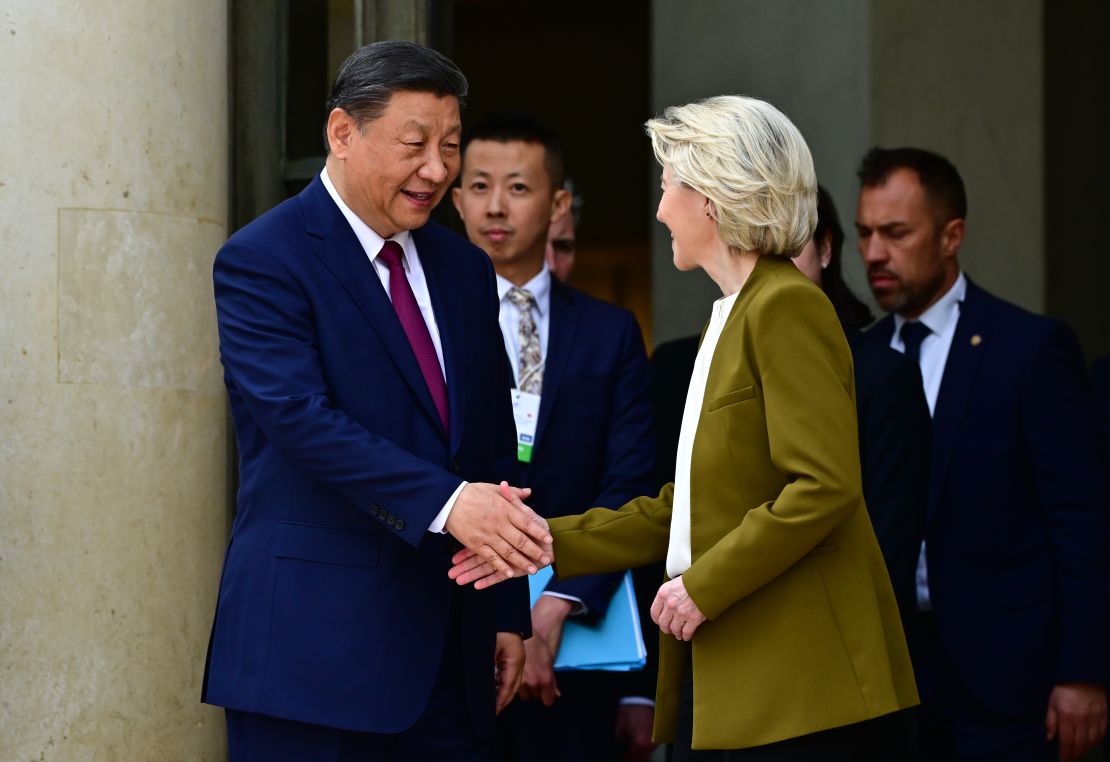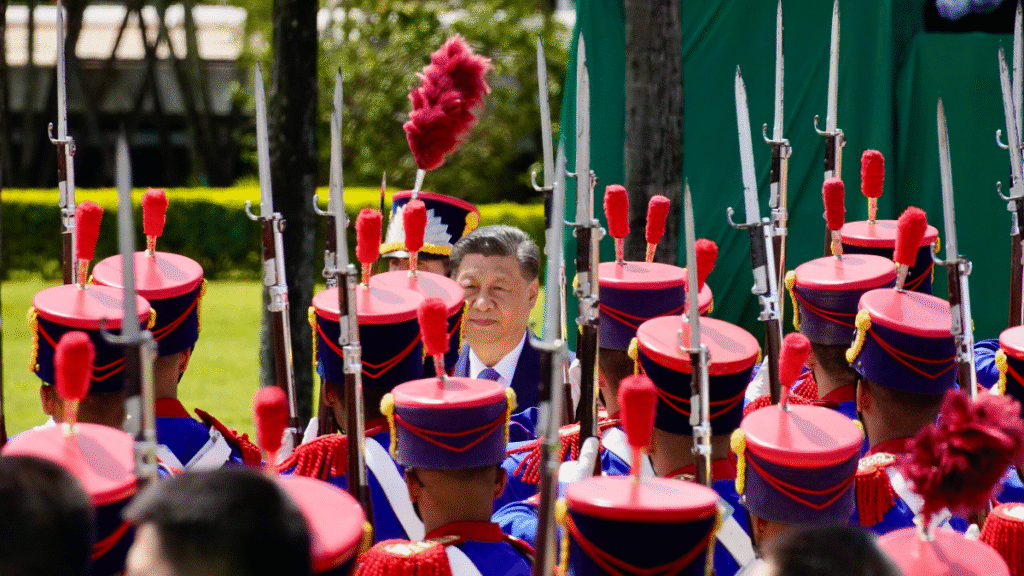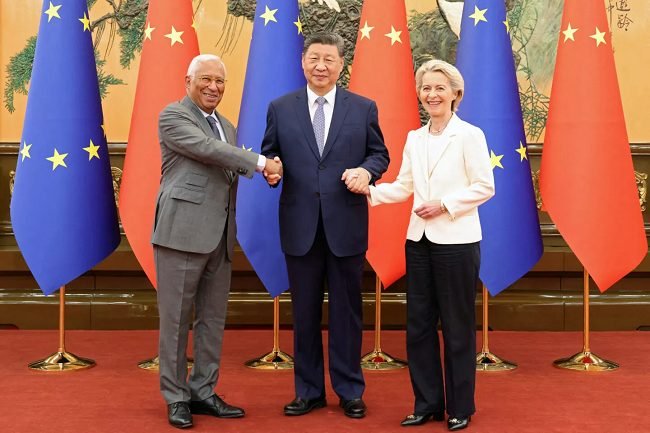Hong Kong
CNN
—
As the two biggest economic targets in Donald Trump’s trade war, some analysts thought the European Union and China could move closer together and stake out common ground.
But a summit between the two sides in Beijing on Thursday is instead expected to showcase the deep-seated frictions and mistrust that are widening a rift between the two heavyweights.
European Council President Antonio Costa and European Commission President Ursula von der Leyen are set to meet Chinese leader Xi Jinping and hold summit talks with Chinese Premier Li Qiang in Beijing.
The meeting comes as both countries have faced heightened tariffs on their exports to the US – with uncertainties in US trade relations driving Beijing to look to tighten ties with the EU and other major economies.
But a list of grievances between the two sides are setting that goal out of reach.
The EU was far from shy about its concerns in the lead up to the summit. Officials in recent weeks have reiterated their long-standing concerns over what they say are inexpensive Chinese goods “flooding” European markets, raised alarms about Beijing’s move to squeeze the rare earths supply chain, and decried its ongoing backing for Russia as it wages war in Ukraine.
Beijing has lashed out against those concerns, including the 27-member bloc’s move last year to raise tariffs on its electric vehicles, launching a range of its own trade probes in apparent retaliation.

After the EU last month announced it was barring Chinese companies from participating in public tenders for medical devices over a certain value, Beijing hit back with its own curbs on government purchases of Europe-made devices.
On Monday, China’s Ministry of Commerce slammed the EU decision to include two Chinese banks and a handful of other firms in its latest sanctions against Russia over its invasion of Ukraine. It claimed the move would have a “severely negative impact on China-EU economic and trade relations.”
China’s Commerce Minister Wang Wentao lodged solemn representations — diplomatic speak for formally expressing serious discontent — over the sanctions in a video call with EU trade chief Maros Sefcovic on Tuesday. The two officials had “candid and in-depth” discussions on China-EU economic and trade cooperation and key issues of concern, the Chinese Commerce Ministry said in a statement.
All this sets the stage for a contentious summit, ostensibly meant to celebrate 50 years of relations, that’s already been whittled from a planned two days to a single-day event.
“We should expect a very difficult moment and not a deal making moment,” said Abigaël Vasselier, head of the Foreign Relations team at MERICS think tank in Germany, during a media briefing this week.
And in some ways that mirrors frictions between the China and the US, she added: “China has created leverage over Europe, has gone into a tit-for-tat escalation with Europe, and has linked all issues. You could almost say this looks like a Trump playbook used by China on Europe.”
Trump’s trade war – and his negotiations with both major economies – is also casting a long shadow over the summit.
There were signs earlier this year that Beijing hoped shared adversity in the face of tariff threats from the US could push China and Europe together. And earlier this month, Beijing granted a reprieve for Europe’s major cognac makers following an anti-dumping probe widely seen as retaliation for the bloc’s imposition of up to 45% tariffs on its electric vehicles last year.
But in separate addresses to G7 leaders and European lawmakers in recent weeks, von der Leyen made clear the bloc’s deep concerns about Beijing had been unresolved.
“China is using this quasi-monopoly (on rare earths) not only as a bargaining chip, but also weaponizing it to undermine competitors in key industries,” she said to G7 leaders meeting in Canada in June.
Beijing has extensive control over supply chains for these critical minerals key in everything from EV batteries and cell phones to fighter jets and roiled global manufacturing after placing export controls on some such minerals amid its trade spat with the US. China agreed during a truce with the US in June to ease these controls.
Von der Leyen also called for unified G7 action to pressure Beijing as it “floods global markets with subsidized overcapacity that its own market cannot absorb.”

While von der Leyen has long been hawkish on Beijing, voices in China have seen her as pandering to the US to ease trade frictions – and are watching closely for signs that a potential US-EU trade deal could target their economy.
But China’s leaders are also joining this week’s summit in what they see as a relatively strong position relative to the EU when it comes the US talks.
Beijing sees its decision to play hardball with the US, by raising tit-for-tat levies and then showing the power of its rare earths leverage, as paying off – bringing the US to the negotiating table twice and resulting with an agreement for a trade framework.
Even as frictions remain – including China’s purchases of Russian oil and Washington’s elevated tariffs on Chinese goods – Beijing has already chalked wins, like the announced resumption of sales of Nvidia’s H20 AI chips to China, in a reversal of an April US export ban.
The EU, meanwhile, is scrambling ahead of an August 1 deadline to cut a deal with the US to avert heavy tariffs – and may see more at stake than their Chinese counterparts.
“The worst-case scenario would be for Europe to find itself in a two-front trade war with the US and China at a time when Trump is pressing for some sort of Faustian bargain with Beijing,” said Noah Barkin, a Berlin-based visiting senior fellow at the German Marshall Fund of the United States think tank.
With this backdrop, chances for any concrete outcomes appear low to observers on both sides, who instead stress that dialogue can be a form of progress in itself.
Europe has been clear that it doesn’t want to cut ties with China, but rather “rebalance” its economic relationship, which saw a more than 300 billion Euro deficit last year. It also aims to “derisk” its supply chains, and work together with China on shared global issues like climate change – a potential area of agreement this week.
But experts say a key hold-up for Europe has been a sense that Beijing is unmoved by Brussels’ core concerns.
“We haven’t had an EU-China summit that produced real deliverables for many years and this one won’t be any different. That is a reflection of Beijing’s refusal to address the EU’s two biggest concerns: an increasingly imbalanced economic relationship that poses a growing threat to European industry and China’s ongoing support for Russia,” said Barkin.
China has rejected Europe’s concerns about industrial overcapacity leading to a flood of exports as baseless, with one state media outlet recently saying that instead of “rebalancing trade,” Europe to “needs to recalibrate its mentality.”

Instead, Beijing is expected to continue to push for setting minimum prices of Chinese-made EVs in Europe instead of tariffs, as well as unfettered access to European technology and markets. And even as Russia ramps up its assault on Kyiv, Beijing is unlikely to give any sign of a shift in that position on Moscow, its close partner.
Chinese Foreign Minister Wang Yi reportedly told the European Union’s top diplomat earlier this month that Beijing can’t accept Russia losing its war against Ukraine as this could allow the United States to turn its full attention to China.
China has long claimed neutrality in the war and defended its “normal trade” with Russia, while ramping up purchases of its oil and shipping goods Western leaders say power Russia’s defense industry.
But observers in China still feel there’s room for collaboration as the two sides sit down on Thursday.
“To solve challenges from climate change to AI and global conflicts, the European Union needs China, and China needs the European Union,” according to Wang Yiwei, director of the Institute of International Affairs at Renmin University in Beijing.
Alluding to the view that the EU can be a counterweight for China against US frictions and a partner in promoting globalization, he added: “If China and the European Union seek win-win cooperation, the so-called new Cold War cannot prevail.”






